Daily Vocabulary Words: List of Daily Used Words in Leading Indian Newspapers
Hi there. Welcome to this special section @ Wordpandit. Our endeavour here is straightforward: highlighting daily vocabulary words that you would come across in leading newspapers in the country. We have included the following newspapers in our selection:
• The Times of India
• The Economic Times
• Hindustan Times
• Mint
• Indian Express
We are putting in extensive work to develop your vocabulary. All you have to do is be regular with this section and check out this post daily. This is your repository of commonly used words; essentially, we are posting a list of daily used words. Hence, this has significant practical application as it teaches you words that are commonly used in leading publications mentioned above.
Visit the website daily to learn words from leading Indian newspapers.
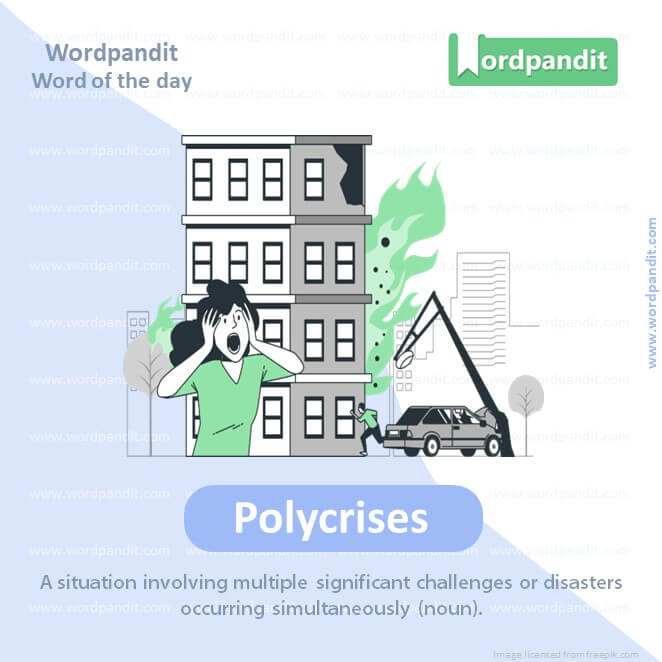
WORD-1: Polycrises
CONTEXT: Since the publication of Megathreats in October 2022, the themes I emphasized have gone mainstream. Everyone now acknowledges that economic, monetary and financial threats are rising and interacting in dangerous ways with various other social, political, geopolitical, environmental, health and technological developments. Hence, in December 2022, the Financial Times chose “polycrises” as one of its buzzwords of the year. Whatever one’s preferred term (others have adopted “permacrisis” or “confluence of calamities”), there is growing recognition that not only the global economy, but also human survival is at risk.
SOURCE: Livemint
EXPLANATORY PARAGRAPH: Imagine you have to do your homework, clean your room, and help in the kitchen all at the same time. That’s a lot, right? Well, “polycrises” is like that, but for big problems in the world. It means many different troubles or crises are happening at the same time.
MEANING: A situation involving multiple significant challenges or disasters occurring simultaneously (noun).
PRONUNCIATION: pah-lee-kr-eye-sees
SYNONYMS: Multiple crises, Concurrent emergencies, Series of disasters, Chain of problems, Successive calamities
USAGE EXAMPLES:
1. The government is struggling to manage the polycrises of economic downturn, health emergencies, and environmental issues.
2. Experts are concerned about the polycrises affecting global markets.
3. The simultaneous occurrence of climate change, wars, and pandemics can be described as polycrises.
4. Addressing polycrises requires coordinated efforts from international organizations.
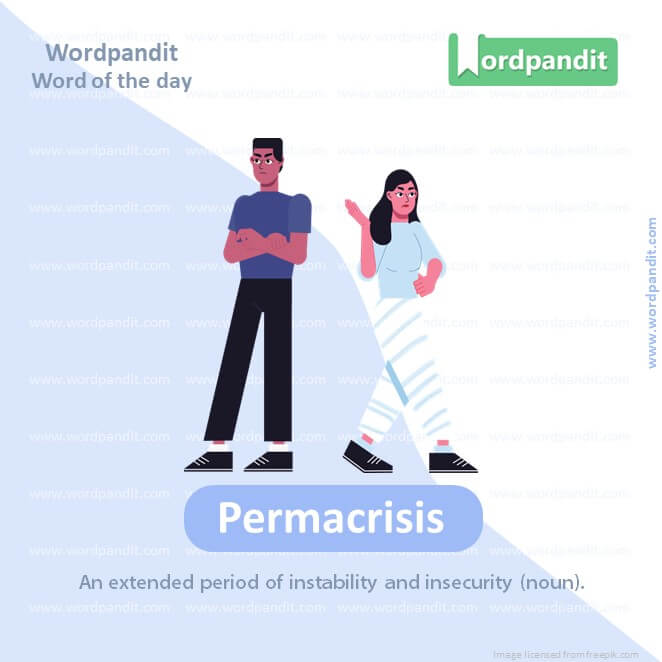
WORD-2: Permacrisis
CONTEXT: Since the publication of Megathreats in October 2022, the themes I emphasized have gone mainstream. Everyone now acknowledges that economic, monetary and financial threats are rising and interacting in dangerous ways with various other social, political, geopolitical, environmental, health and technological developments. Hence, in December 2022, the Financial Times chose “polycrises” as one of its buzzwords of the year. Whatever one’s preferred term (others have adopted “permacrisis” or “confluence of calamities”), there is growing recognition that not only the global economy, but also human survival is at risk.
SOURCE: Livemint
EXPLANATORY PARAGRAPH: Think of a time when your toy was broken and it seemed like it would never be fixed. “Permacrisis” is a word that means a big problem that lasts a very long time and seems like it won’t go away.
MEANING: An extended period of instability and insecurity (noun).
PRONUNCIATION: pur-muh-kry-sis
SYNONYMS: Endless trouble, Long-term crisis, Prolonged turmoil, Continuing emergency, Persistent difficulty
USAGE EXAMPLES:
1. The country has been in a permacrisis since the economic collapse.
2. Environmental degradation is leading to a permacrisis in certain regions.
3. The political permacrisis has been affecting the nation for decades.
4. Experts are discussing solutions to the ongoing permacrisis.
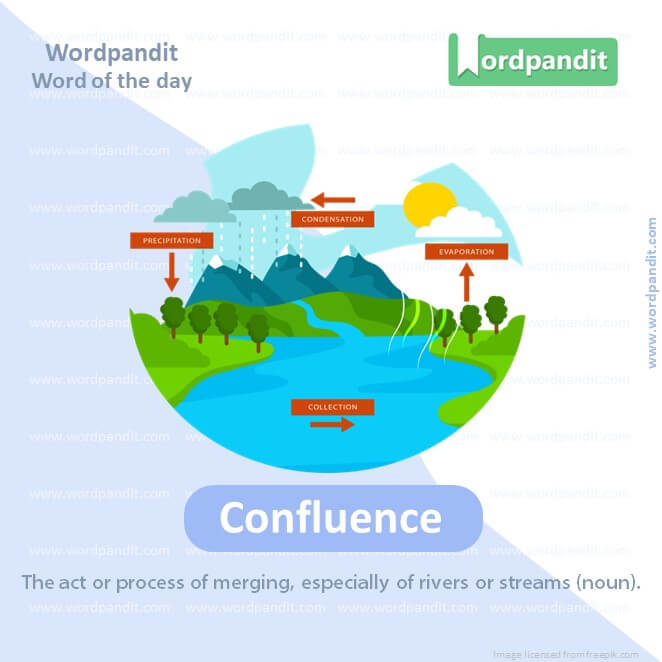
WORD-3: Confluence
CONTEXT: Since the publication of Megathreats in October 2022, the themes I emphasized have gone mainstream. Everyone now acknowledges that economic, monetary and financial threats are rising and interacting in dangerous ways with various other social, political, geopolitical, environmental, health and technological developments. Hence, in December 2022, the Financial Times chose “polycrises” as one of its buzzwords of the year. Whatever one’s preferred term (others have adopted “permacrisis” or “confluence of calamities”), there is growing recognition that not only the global economy, but also human survival is at risk.
SOURCE: Livemint
EXPLANATORY PARAGRAPH: Imagine two rivers coming together to form a bigger river. This joining is called “confluence”. It’s like when two things come together and mix or meet.
MEANING: The act or process of merging, especially of rivers or streams (noun).
PRONUNCIATION: kon-floo-uhns
SYNONYMS: Junction, Union, Meeting, Merge, Intersection
USAGE EXAMPLES:
1. The confluence of the two rivers creates a spectacular view.
2. There was a confluence of ideas during the brainstorming session.
3. The festival celebrated the cultural confluence of different communities.
4. The confluence of historical events led to major changes.
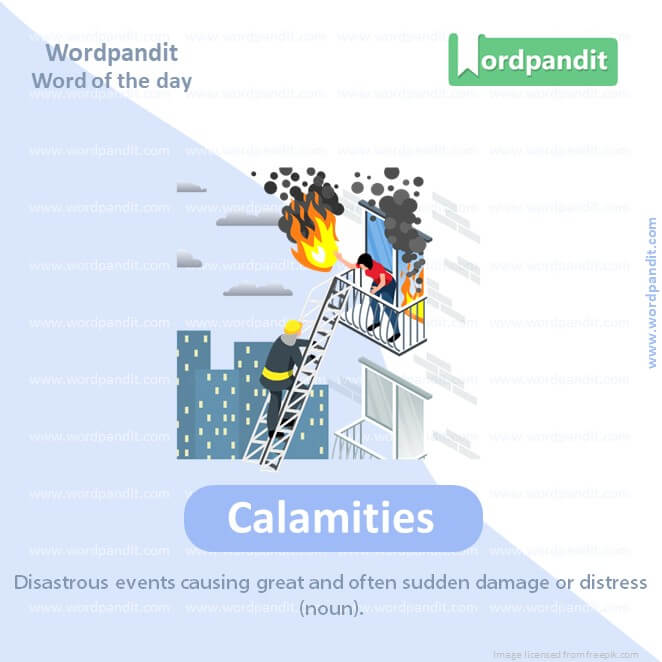
WORD-4: Calamities
CONTEXT: Since the publication of Megathreats in October 2022, the themes I emphasized have gone mainstream. Everyone now acknowledges that economic, monetary and financial threats are rising and interacting in dangerous ways with various other social, political, geopolitical, environmental, health and technological developments. Hence, in December 2022, the Financial Times chose “polycrises” as one of its buzzwords of the year. Whatever one’s preferred term (others have adopted “permacrisis” or “confluence of calamities”), there is growing recognition that not only the global economy, but also human survival is at risk.
SOURCE: Livemint
EXPLANATORY PARAGRAPH: Calamities are like really big, bad things that happen, such as a huge storm or an earthquake. They are events that cause a lot of trouble or damage.
MEANING: Disastrous events causing great and often sudden damage or distress (noun).
PRONUNCIATION: kuh-lam-ih-tees
SYNONYMS: Disasters, Catastrophes, Tragedies, Misfortunes, Crises
USAGE EXAMPLES:
1. The earthquake and the flood were calamities that affected thousands.
2. The country has faced several calamities this year.
3. Stories of past calamities were shared at the community meeting.
4. Aid organizations help people recover from various calamities.
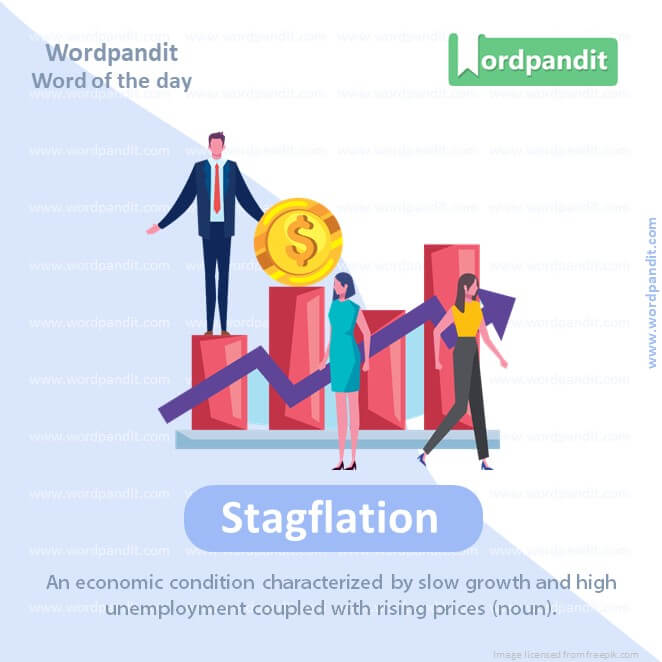
WORD-5: Stagflation
CONTEXT: As I warned in Megathreats, the so-called Great Moderation (a long period of low macroeconomic volatility following the mid-1980s) has given way to the Great Stagflation. In 2022, we witnessed a surge of inflation in advanced economies and emerging markets, a sharp slowdown of global growth that continued into 2023, and signs of severe private- and public-sector debt problems as central banks raised policy rates to stabilize prices.
SOURCE: Livemint
EXPLANATORY PARAGRAPH: Imagine if things in the store became more expensive, but at the same time, people’s money didn’t grow, and some even lost their jobs. That’s called “stagflation”. It’s when prices go up, but the economy is not doing well.
MEANING: An economic condition characterized by slow growth and high unemployment coupled with rising prices (noun).
PRONUNCIATION: stag-flay-shun
SYNONYMS: Economic stagnation, Inflationary recession, Price-rise slowdown, Stalled growth, Inflationary slump
USAGE EXAMPLES:
1. The 1970s are often cited as a period of stagflation.
2. Economists are concerned about the possibility of stagflation due to current trends.
3. Measures to combat stagflation include monetary and fiscal policies.
4. Stagflation poses a unique challenge to economic stability.
WORD-6: Surge
CONTEXT: As I warned in Megathreats, the so-called Great Moderation (a long period of low macroeconomic volatility following the mid-1980s) has given way to the Great Stagflation. In 2022, we witnessed a surge of inflation in advanced economies and emerging markets, a sharp slowdown of global growth that continued into 2023, and signs of severe private- and public-sector debt problems as central banks raised policy rates to stabilize prices.
SOURCE: Livemint
EXPLANATORY PARAGRAPH: Think of a time when a lot of water suddenly came onto the beach. That’s a “surge”. It means a sudden large increase or movement of something.
MEANING: A sudden powerful forward or upward movement, especially by a crowd or by a natural force like the waves (noun).
PRONUNCIATION: surj
SYNONYMS: Rush, Wave, Upswing, Upsurge, Spurt
USAGE EXAMPLES:
1. There was a surge in demand for the new toy.
2. The city experienced a power surge during the storm.
3. The surge of water flooded the coastal area.
4. The concert ended with a surge of fans towards the stage.
WORD-7: Decoupling
CONTEXT: For example, de-globalization has continued, with more countries shifting from free trade to secure trade, and from economic integration to decoupling and ‘de-risking.’ Reshoring, near- shoring, and ‘friend-shoring’ imply a trade-off between efficiency and resilience, with just-in-time global supply chains being replaced by ‘just-in-case’ arrangements.
SOURCE: Livemint
EXPLANATORY PARAGRAPH: Imagine two trains attached together. If they are separated, they are “decoupling”. It means taking apart two things that were connected.
MEANING: The action or process of separating or becoming less dependent on each other (noun).
PRONUNCIATION: dee-kup-ling
SYNONYMS: Disconnection, Separation, Detachment, Disengagement, Disassociation
USAGE EXAMPLES:
1. The decoupling of the two companies led to significant changes in the market.
2. There’s a trend towards decoupling economic growth from environmental impact.
3. Technological advances have allowed for the decoupling of traditional constraints.
4. Decoupling strategies are important in risk management.
WORD-8: Reshoring
CONTEXT: For example, de-globalization has continued, with more countries shifting from free trade to secure trade, and from economic integration to decoupling and ‘de-risking.’ Reshoring, near- shoring, and ‘friend-shoring’ imply a trade-off between efficiency and resilience, with just-in-time global supply chains being replaced by ‘just-in-case’ arrangements.
SOURCE: Livemint
EXPLANATORY PARAGRAPH: Imagine a company that made toys in another country decides to make them back in our country. That’s called “reshoring”. It means bringing back jobs or production to one’s own country.
MEANING: The practice of transferring a business operation that was moved overseas back to the country from which it originally relocated (noun).
PRONUNCIATION: ree-shor-ing
SYNONYMS: Backsourcing, Repatriation of manufacturing, Return migration, Inshoring, Homecoming of production
USAGE EXAMPLES:
1. The company announced its plans for reshoring some of its manufacturing units.
2. Reshoring is seen as a way to boost local employment.
3. Economic policies are increasingly focusing on incentives for reshoring.
4. Reshoring can help reduce shipping costs and lead times.
WORD-9: Resilience
CONTEXT: For example, de-globalization has continued, with more countries shifting from free trade to secure trade, and from economic integration to decoupling and ‘de-risking.’ Reshoring, near-shoring, and ‘friend-shoring’ imply a trade-off between efficiency and resilience, with just-in-time global supply chains being replaced by ‘just-in-case’ arrangements.
SOURCE: Livemint
EXPLANATORY PARAGRAPH: Think about a time when you fell down but got right back up and kept playing. That’s being “resilient”. It means you can face problems or changes and not give up.
MEANING: The capacity to recover quickly from difficulties; toughness (noun).
PRONUNCIATION: ree-zil-yuhns
SYNONYMS: Toughness, Strength, Bounce-back ability, Endurance, Adaptability
USAGE EXAMPLES:
1. Her resilience in the face of adversity is inspiring.
2. The city’s resilience to natural disasters has improved.
3. Building resilience in communities is essential for facing future challenges.
4. Emotional resilience is key to overcoming personal setbacks.
WORD-10: Hampering
CONTEXT: Moreover, societal ageing in Europe, Japan and China is reducing the supply of workers at a time when immigration restrictions are hampering the flow of labour from poor to rich countries—all of which increases labour costs.
SOURCE: Livemint
EXPLANATORY PARAGRAPH: Imagine you’re trying to run fast, but there’s a big rock in your way. That rock is “hampering” you. It means something is making it hard for you to do what you want to do.
MEANING: To hinder or impede the movement or progress of something (verb).
PRONUNCIATION: ham-puh-ring
SYNONYMS: Hindering, Obstructing, Impeding, Interfering, Blocking
USAGE EXAMPLES:
1. The heavy snowfall is hampering rescue efforts.
2. Unnecessary regulations are hampering business growth.
3. The injury was hampering his ability to play the sport.
4. Technical difficulties were hampering the progress of the project.
Vocabulary
Language is a confluence of thoughts, emotions, and experiences that find vibrant expression through words. In this spectrum, ‘vocabulary’ shines as a critical aspect that shapes and directs our language proficiency. It offers depth, nuance, and clarity to our expressions. However, mastering ‘vocabulary’ is an art that requires a strategized approach.
An intensive strategy for learning ‘vocabulary’ goes beyond the limiting precincts of memorization. Instead, it nudges learners towards comprehension and application. To understand ‘vocabulary’, take a step forward from traditional textbooks and classroom sessions, and embrace the vast world of books, articles, podcasts or digital content in the language you are learning. This step allows you to understand words in context, see how they are used in different situations, and absorb words as part of the natural flow of language.
As you journey through ‘vocabulary’, remember that this expedition should not be a race. Rather, it’s a marathon where pacing yourself is pivotal to long-term success. Learning a few words each day and consolidating your knowledge through regular revision tends to be more effective, as it prevents cognitive overload and promotes solid retention.
Interactive learning tools can provide valuable support in assimilating ‘vocabulary’. Use of flashcards, language-learning apps, or memory-enhancing software can make this process more engaging and effective, reinforcing the ‘vocabulary’ in your memory.
Lastly, practice is an incontrovertible part of mastering ‘vocabulary’. Utilize the learnt vocabulary in your daily conversations, write-ups, or presentations to ensure an active application. Doing this fosters recall and cements understanding.
In summation, learning ‘vocabulary’ is a journey that should be embraced with an integrated approach, where understanding and application are the key elements. By engaging with diverse learning resources, pacing the learning process, employing interactive learning tools, and practicing regularly, the journey of mastering ‘vocabulary’ becomes a fulfilling and enriching experience.













